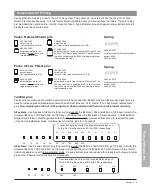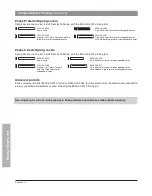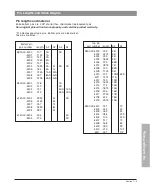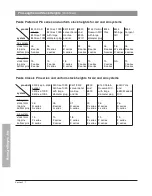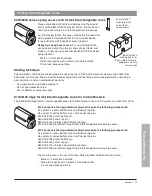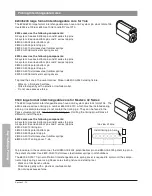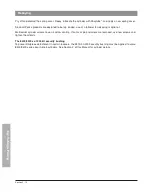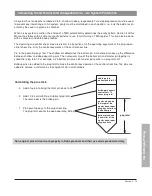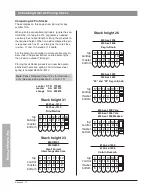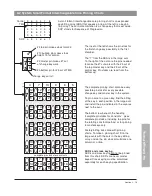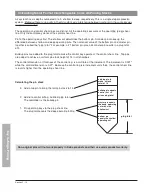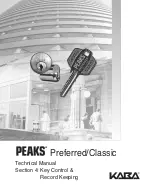
#4 top pin makes stack total 23.
#12 buildup pin makes stack
height 19 for control.
#2 master pin makes #7 cut
of change key work.
#5 bottom pin for #5 cut of TMK
change key cut is 7
Section 3 - 18
K
e
y
C
u
tt
in
g
&
P
in
n
in
g
4
12
2
5
A small format interchangeable core pinning chart is an expanded
key bitting array (KBA) that speeds pinning. At the left is a key bit-
ting array. The control combination is a change key that is set aside.
SOP stands for Sequence of Progression.
7
The inset at the left shows the pin stack for
the first change key possibility in the first
chamber.
The “7” from the KBA is in the large oval.
To the right of the oval are the pins needed
to make the #7 cut work with the #5 cut of
the top master key and the #9 cut of the
control key. Pin stacks are read from the
bottom up.
The complete pinning chart contains every
possible pin stack for every possible
change key and master key in the system.
To pin a core to a given key, find the bitting
of the key in each position in the large oval
and install the pins indicated in the squares
next to the oval.
The bottom row beneath the heading
“complete pin stacks for constants”, gives
complete pin stacks, including top pins, for
the rotating constant method, or for pinning
to master keys only.
Factory bitting lists come with pinning
charts. To make a pinning chart, fill in the
large ovals with the cuts in the key bitting
array, and do the pin stack calculations one
column at a time.
SKD’s and cross keying
SKD’s and cross keying cannot be pinned
from this chart. SKD’s are never master
keyed. Cross keying must be calculated
separately for each keying specification.
top
pins
complete pin stacks for constants
4
7
13
9
6
5
12
12
2
6
14
12
2
2
6
2
2
2
5
2
2
6
1
4
14
14
2
8
12
14
2
2
4
6
4
2
3
0
4
0
1
2
14
8
2
8
8
14
4
6
2
4
8
4
1
2
6
2
1
0
10
10
2
8
10
10
4
4
8
2
6
4
5
2
0
4
1
4
4
7
13
9
6
5
14
14
2
8
16
14
5
2
8
6
1
4
7
4
2
8
3
6
3
0
4
0
5
2
1
8
6
2
9
0
9
6
0
4
7
8
5
2
8
6
1
4
Control 9 6 0 4 7 8
TMK 5 2 8 6 1 4
7 4 2 8 3 6
3 0 4 0 5 2
1 8 6 2 9 0
9 6 0 4 7 8
SOP a b c d e f
A2 System Small Format Interchangeable Core Pinning Charts
Summary of Contents for Peaks Preferred
Page 1: ...Technical Manual Preferred Classic ...
Page 3: ...Peaks Preferred Classic Notes ...
Page 4: ...Technical Manual Section 1 Introduction Preferred Classic ...
Page 12: ...Technical Manual Section 2 Product Information Preferred Classic ...
Page 19: ...Section 2 7 Product Information Peaks Preferred Classic Notes ...
Page 41: ...Section 2 30 Product Information Peaks Preferred Classic Notes ...
Page 42: ...Section 2 31 Product Information Peaks Preferred Classic Notes ...
Page 43: ...Section 2 32 Product Information Peaks Preferred Classic Notes ...
Page 44: ...Technical Manual Section 3 Key Cutting and Pinning Preferred Classic ...
Page 66: ...Section 3 22 Key Cutting Pinning Peaks Preferred Classic Notes ...
Page 67: ...Section 3 23 Key Cutting Pinning Peaks Preferred Classic Notes ...
Page 68: ...Preferred Classic Technical Manual Section 4 Key Control Record Keeping ...
Page 79: ...Section 4 11 Key Control Record Keeping Peaks Preferred Classic Notes ...
Page 80: ...Preferred Classic Technical Manual Section 5 Cylinder Installation Guide ...
Page 91: ...Section 5 11 Cylinder Installation Guide Peaks Preferred Classic Notes ...

